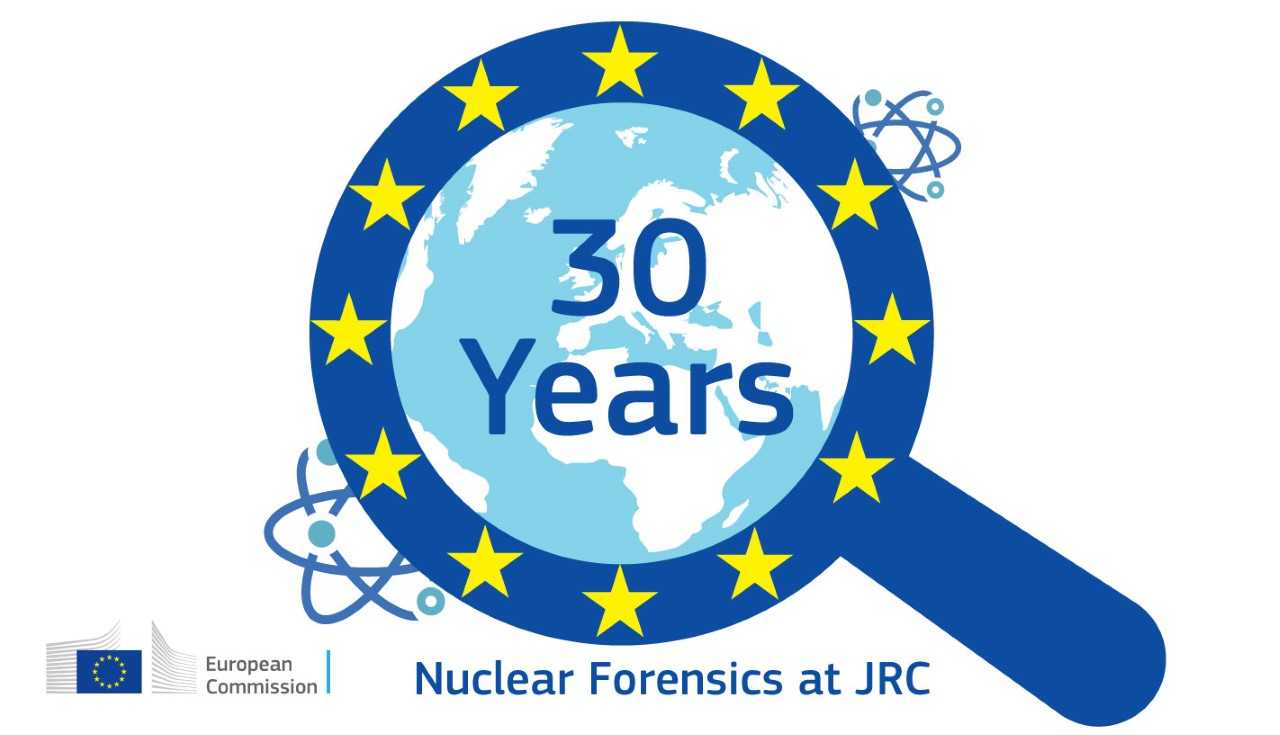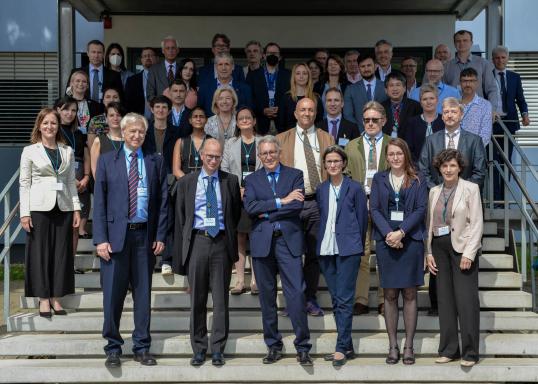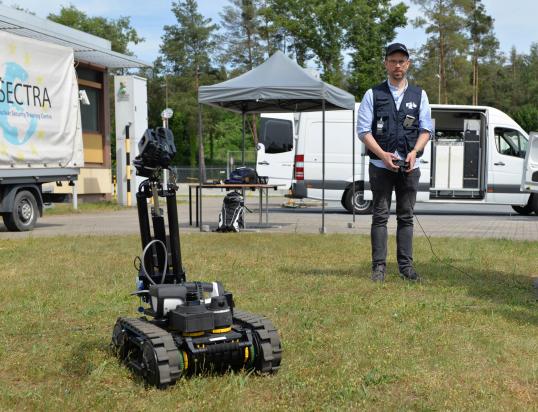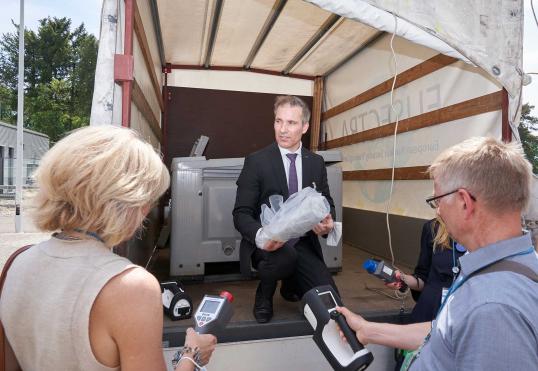The JRC has been a global pioneer in nuclear forensic science since the early 1990s. Nuclear forensics is key in keeping nuclear materials off the black market, bringing nuclear smugglers to justice and enabling the identification of the origin of the intercepted material, thus providing essential information for improving preventive measures.
- nuclear non-proliferation
- Thursday 19 May 2022, 08:00 - Friday 20 May 2022, 12:00 (CEST)
- Karlsruhe, Germany
Practical information
- When
- Thursday 19 May 2022, 08:00 - Friday 20 May 2022, 12:00 (CEST)
- Where
- JRCKarlsruhe, Germany
- Languages
- English
Report

The JRC has been a global pioneer in nuclear forensic science since the early 1990s. Nuclear forensics is key in keeping nuclear materials off the black market, bringing nuclear smugglers to justice and enabling the identification of the origin of the intercepted material, thus providing essential information for improving preventive measures.
JRC supports national and international authorities
Since 1992, the JRC has been providing support to national and international authorities through the analysis of intercepted nuclear materials and takes a leading position worldwide in this specialised area.
With the breakup of the Soviet Union, illicit trafficking of nuclear materials became a major security concern. Yet, thanks to effective measures taken at national and international level, these concerns have not led to any major public emergencies. The JRC has been involved in nuclear forensic investigations from the very beginning.
The first sample of seized material was taken to JRC Karlsruhe laboratories on 9 March 1992, almost exactly 30 years ago. Working behind the scenes to keep us safe, the JRC has helped EU Member States successfully investigate more than 60 incidents involving nuclear or other radioactive material.
30 years providing this nuclear forensics support
Today, an event in Karlsruhe has marked the celebration of 30 years providing this nuclear forensics support. It has brought together experts and policy makers from the European Commission, the German Federal Office for Radiation Protection, the International Atomic Energy Agency (IAEA), the Technology Region Karlsruhe as well as representatives of EU Member States and other public authorities from the US and Germany.
Eva Szeles-Kovacs, the representative of the IAEA's Division of Nuclear Security referred to JRC as a unique laboratory for nuclear forensics. She underlined the JRC contributions to the IAEA's program on developing guidance, coordinated research and training for nuclear forensics. She also gave some prospects for future international cooperation in nuclear security.
From a political point of view, Daniel Caspary, Member of the European Parliament, gave an overview of the Regional and European Dimension of the Security Union.
The EU and EC services, represented by Bernard Magenhann, EC-JRC, Deputy Director General and by Massimo Garribba, Deputy Director General of the Directorate-General for Energy, focussed on the important role of the JRC a science organisation supporting nuclear security policies and on the implementation of the specific activities in the Safeguards, Safety and Security areas – three pillars for making the world a safer place.
The perspective of EU member states were illuminated by Inge Paulini, German Federal Office for Radiation Protection, and Nico H.W. van Xanten, ANVS, Advisor Nuclear Affairs, The Netherlands. The representative of BfS presented the work complementing national capabilities in countering nuclear threats. The Dutch Advisor for Nuclear Affairs highlighted the work of the JRC providing nuclear forensic support to a Member State in incidents involving nuclear material found out of regulatory control. The scientific technical support in the nuclear forensic area provided by JRC, in this view, is essential for the Member States. "The 30 years of cooperation between the Member States and the European Commission through the JRC have proven to be solid and fruitful", he stated.
Art Atkins, on behalf of US Department of Energy National Nuclear Security Administration, highlighted the joint activities in the nuclear forensics area carried out with the JRC. He expressed particular appreciation for the unique training opportunities offered at the JRC facilities.
The JRC is recognised as a centre of excellence in nuclear forensics
Nuclear forensics is a highly sophisticated methodology, available only in few specialised laboratories worldwide.
Recognised as a centre of excellence by national and international policing bodies, the JRC has developed various methods that allow identification of the origin of intercepted material and the probable intended use.
Moreover, the JRC maintains an extensive database of commercial nuclear materials, together with information on seized illicit materials, helping the investigators in providing hints on the origin of the material.
Fighting against illicit trafficking of nuclear materials
Fighting against illicit trafficking of nuclear materials calls for strengthened international co-operation and improved measures for prevention, detection and response. JRC scientists provide tailored expertise, advanced technical tools and results on nuclear forensic science to the European Atomic Energy Community (Euratom), the International Atomic Energy Agency (IAEA) and EU Member States.
The JRC also co-chairs the “Nuclear Forensics International Technical Working Group” (ITWG) together with the US Department of State. This working group brings together scientists, experts, law enforcement personnel and nuclear security administrators from all over the world in order to establish and promote best practices, to develop methodologies and to establish guidelines for nuclear forensic investigations.
It should also be noted, that the JRC works with US Department of Energy, IAEA and other international partners in the “Border Monitoring Working Group” on technologies, equipment and training related to the detection of nuclear material out of regulatory control.
Cooperative projects with EU countries and beyond
Furthermore, the JRC has been implementing a number of cooperative projects in EU countries, but also with Armenia, Ukraine, Moldova, Georgia, Azerbaijan and in South East Asia in order to enhance their nuclear forensics capabilities.
Trained staff and skilled experts are essential for an appropriate handling of illicit incidents involving nuclear or other radioactive materials. Therefore, training and knowledge transfer are important elements for capacity building in nuclear security.
To this end, The JRC’s European Nuclear Security Training Centre provides training to scientists and nuclear inspectors.
Working together to keep Europeans all safe
Finally, the participants of the event could also explore how the JRC, EU countries and the international community work together to keep Europeans all safe.
During the visit of the highly specialised laboratories, the latest developments in nuclear forensics, from cutting edge equipment to Artificial Intelligence were presented.
It was also shown how nuclear forensics scientists detect and analyse nuclear material, work with law enforcement to manage crime scenes, and carry out particle analysis to check for undeclared nuclear activity and uncover the source of materials that are seized.
Press and Media Coverage
Karlsruher Atomdetektive fahnden nach radioaktivem Material - SWR Aktuell
Badische Neueste Nachrichten - BNN:



